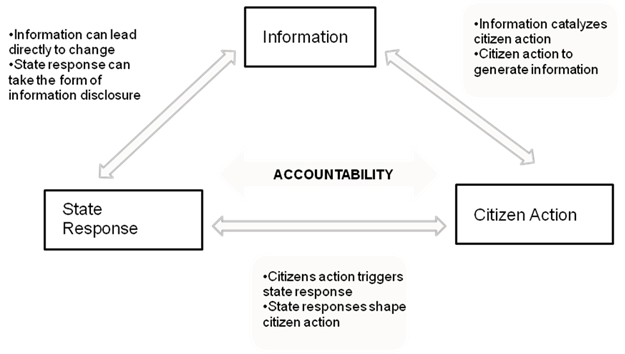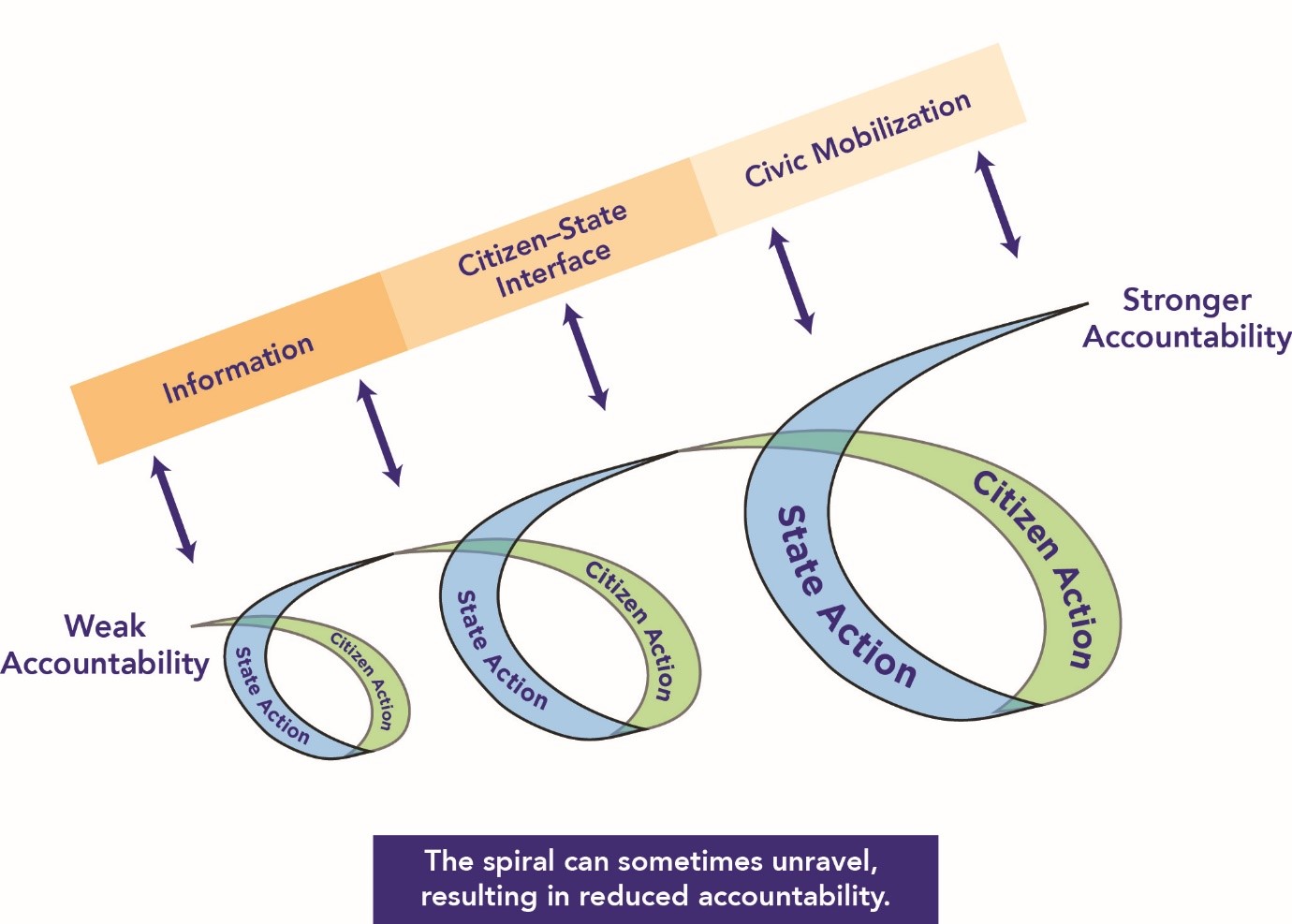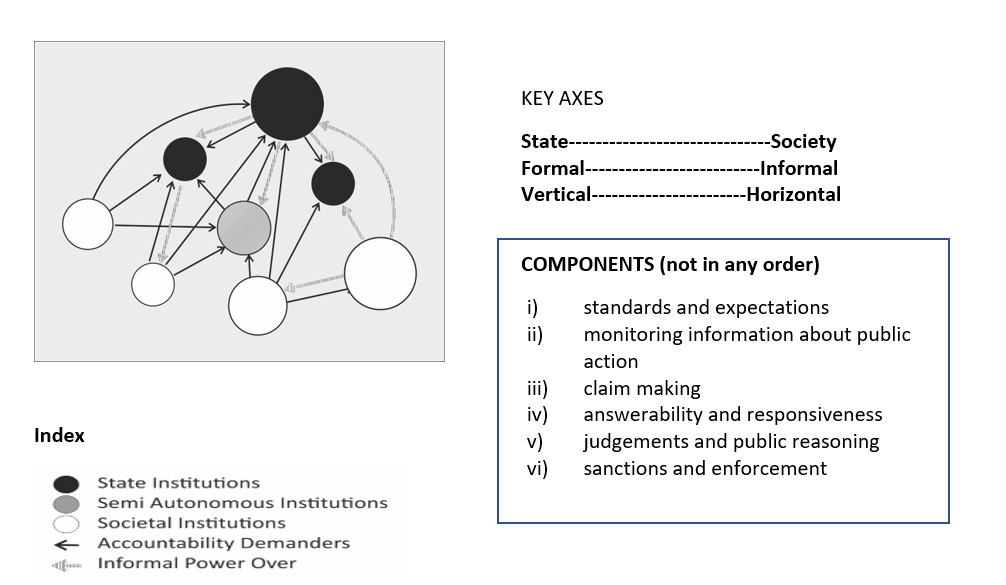The Use of ‘Causal Chain’ Analysis in Strengthening Public Accountability
There is some consensus in the development community that blueprint interventions do not work; that context matters in shaping outcomes; therefore, development interventions need to be adapted to the specific context within which they are applied. What is less clear however, is precisely which elements of context are relevant; for context encompasses everything from the big picture things such as (is it a democracy or is it an authoritarian regime?) to hyperlocal factors (are local elites politically committed to change or not?). The question then is, how can general interventions be tailored to specific contexts?
In the last couple of decades, scholars in the transparency, accountability and participation field have turned to ‘theories of change’ (ToC) as a way of addressing this thorny issue of context. The idea is to spell out how change is likely to occur in specific contexts and how the specific intervention is expected to fit into that process. Thus, ToC’s force practitioners to spell out the initial and intermediate steps that will need to be traversed in order to reach the desired outcomes (Weiss 2000). This approach is meant to make explicit the assumptions underlying individual steps.
More recently, scholars are distinguishing between a Theory of Change (ToC) and a Theory of Action (ToA); in which ToCs are broader beliefs about how change happens in the world, and ToAs are more specific parts that underlie programmatic interventions intended to contribute to some part of the broader ToC (Green 2017). Both these are broad, and often linear conceptions of how progress might be made on accountability.
In this brief piece I argue that we need to replace the language of ToC/ToA by the language of ‘causal chains.’ Causal chains are short, ordered, sequence of situations or events, starting from the initial one to the next, which are linked by actions and assumptions. Spelling out a causal chain involves identifying the assumptions that might shape actions, as well as the contextual conditions that are relevant for the action to lead from present situation to the next. There are several interlinked reasons for advocating for this framing for the accountability and transparency field.
Causal chains are short, ordered, sequence of situations or events, starting from the initial one to the next, which are linked by actions and assumptions.
First, causal chains are small, with just a few links; and fragmented, where the jumps between some links are not clear. Thus, they imply that the full logic of action to outcome may not be fully understood. Mapping out fragments of known or probable causal chains both acknowledges the ambiguities in our understandings, and shifts the focus from knowing the full ToA in advance to learning on the hoof, from the cut and thrust of the battle of pro-accountability forces against the established order.

Figure 1: Potential dynamic links between information, citizen action and state response (Joshi 2014)
Second, causal chains are linear in the sense that each link in the chain traces an action and its outcome, but they are not linear in the sense that no particular direction is implied: regress is as much a possibility as progress. In earlier work I suggested that transparency, participation and responsiveness could each be the starting point of an accountability mini chain that could move in any direction (including obfuscation of information, reduced participation or reprisal) (see Fig 1) (Joshi 2014). Different causal chains in combination, can lead to iterative, positive or negative spirals or even sidesteps in terms of outcomes; and become the starting conditions for the next causal chain (see Fig 2) (Grandvionnet et al. 2015). By contrast, ToCs/ToAs, because they are focussed on progressive trajectories, take a big picture approach and map out the overall path towards the objectives, and usually do not explicitly identify potential reversals and where they might lead.

Figure 2. The iterative nature of social accountability (Grandvionnet et al 2015)
Third, every iteration of a causal chain (or a set of causal chains) creates a new set of starting conditions for future causal chains. These new starting conditions are interesting, because both the mechanisms as well as the participants have been changed through the process of the unfolding of the causal chain. The incremental changes in actors and conditions are important to gauge while developing the next strategy. Activists might get fatigued, public officials might have incremental shifts in their attitudes and behaviours. Or not. But the unfolding process changes the starting points. And the new starting points mean we need to reassess the next causal chain. Which means no matter how robust we think our ToA is, it cannot remain the same.
Fourth, one needs to think of such causal chain analysis as part of a larger network of accountability relationships, like an ecosystem—where each actor/institution is linked through multiple accountability relations to other actors/institutions (see Figure 3) (Joshi 2020). While the literature universally defines accountability as a relationship, it turns out to be actually a set of relationships. We should therefore think of the universe of accountability as a network—in which we need to strengthen multiple relationships of accountability in order to make progress stick. Unpacking the potential effects of our actions throughout the network of accountability relationships seems an important way to understand the outcomes we are likely to miss otherwise.

Figure 3. A network approach to accountability (Joshi 2020)
In sum, a causal chain approach to our understanding of efforts to strengthen transparency, accountability and participation, leads to greater realism about the politics of these processes. It runs counter to the standard development thinking based in log-frames and results. It means acknowledging and living with ambiguity and uncertainty, making the terrain of what we know and where there are gaps in our understandings, avoiding the trap of linear thinking and recognizing the possibilities of reversals. It also means identifying the changes in the context as a result of our interventions as well as other factors as causal processes unfold, taking a systemic approach and locating our particular efforts within the bigger ecosystem and finally, accepting adaptation as necessary and hardwired into institutional processes.
References
Grandvionnet, Helene, Ghazia Aslam and Shomikho Raha. 2015. Opening the Black Box: The Contextual Drivers of Social Accountability. Washington, DC: The World Bank.
Green, Duncan. 2017. “Theories of Change for Promoting Empowerment and Accountability in Fragile and Conflict Affected Settings.” IDS Working Paper 499. Brighton: Institute of Development Studies.
Joshi, Anuradha. 2014. “Reading the Local Context: A Causal Chain Approach to Unpacking Social Accountability Interventions.” IDS Bulletin, 45(5), 23-35.
Joshi, Anuradha. 2020. “Unpacking Public Accountability: A Systemic Framework and an Initial Application to India.” Draft paper. Brighton: Institute of Development Studies.
Weiss, Carol. 2000. “Theory based evaluation: Theories of Change for Poverty Reduction Programs.” In Evaluation and Poverty Reduction. Eds Osvaldo N. Feinstein, et al. Washington, DC: World Bank.


